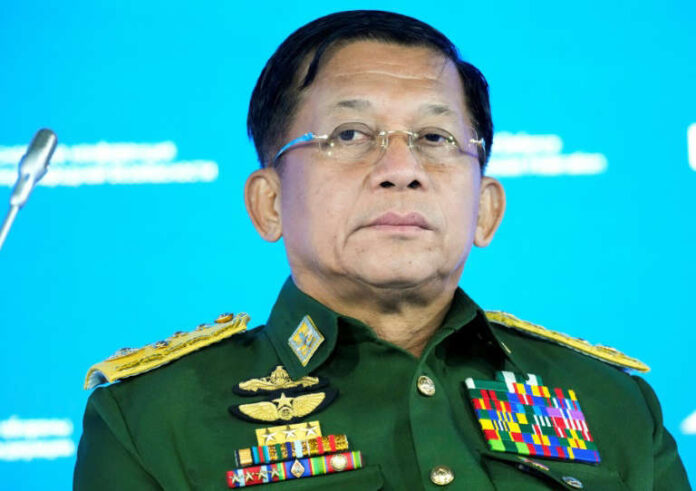Myanmar’s junta, led by Senior General Min Aung Hlaing, slammed a UN report on October 24, 2021, accusing it of using human rights ‘as a political tool to intervene in the internal affairs of Myanmar’. – AFP photo
Myanmar’s junta on Sunday labelled the United Nation’s latest rights report on the conflict-wracked nation an “incitement to violence” and accused the body of interfering in its internal affairs.
The Southeast Asian nation has been in chaos since a February coup, with more than 1,100 killed in a crackdown on dissent, according to a local monitoring group.
On Friday, the UN said it feared an even greater human rights catastrophe amid reports that tens of thousands of troops and heavy weapons were being moved into restive regions in the north and northwest.
The tactics were “ominously reminiscent” of those deployed before a bloody crackdown on the Rohingya minority in 2016-2017, Special Rapporteur on Myanmar Tom Andrews warned the UN General Assembly.
The junta slammed the report on Sunday and accused the UN of using human rights “as a political tool to intervene in the internal affairs of Myanmar”.
The report would “only lead to further division among (the) nation and incitement to internal violence”, the junta-appointed Ministry of Foreign Affairs said in a statement.
Almost nine months after seizing power, the military has been unable to stamp out opposition to its rule, with local “people’s defence forces” clashing regularly with troops.
More than 70 military personnel and 93 police personnel have been killed since February, the junta said in its latest figures on Sunday — although analysts say the military regularly downplays its battlefield losses.
The generals are also under increasing international pressure to engage with their opponents.
Last week, the Association of Southeast Asian Nations (ASEAN) decided to exclude junta chief Min Aung Hlaing from an upcoming summit of the 10-country bloc over doubts about his commitment to defusing the bloody crisis.
It called instead for a “non-political representative” to attend the October 26-28 summit, which the junta said will be “difficult to comply” with.
Britain also said last week it would not be inviting the junta to an upcoming G7-ASEAN foreign ministers meeting.
The coup snuffed out the country’s short-lived experiment with democracy, with civilian leader Aung San Suu Kyi now facing a raft of charges in a junta court that could see her jailed for decades.
Her chief lawyer said earlier this month he had been banned by the military from speaking to journalists, diplomats or international organisations.
The other lawyers on Suu Kyi’s legal team also face a similar ban — effectively muzzling the key sources of information on court proceedings, from which journalists are barred.
Nobel laureate Suu Kyi, who has spent much of her life resisting Myanmar’s generals, is scheduled to testify in court for the first time on Tuesday. – AFP


